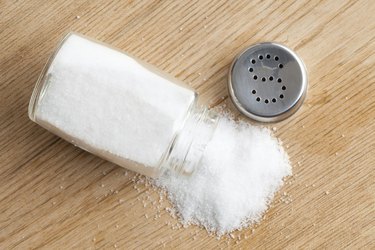
Numbness or tingling of your hands is a sign that there is some underlying problem that is affecting your nerves. Although sodium is an important mineral for your body and is needed for your nerves to work properly, too much sodium in your diet can cause numbness or tingling in your nerves, both due to the effects of sodium on blood pressure and due to the effects of sodium on the nerves.
Sodium and Blood Pressure
Video of the Day

If you consume too much sodium, it can cause your blood pressure to go up. When you eat a lot of sodium, the amount of sodium in your blood will go up. However, your body needs to keep the sodium concentration of your blood within a fairly narrow range. As a result, your kidneys will retain more water, which will help to dilute the excess sodium in your blood. However, this extra blood volume will also increase your blood pressure.
Video of the Day
High Blood Pressure and Tingling

If your blood pressure is too high, it can lead to a tingling sensation in your hands. An increase in blood pressure can causes your blood vessels to swell; if the nerves in your hands are near these swollen blood vessels, they can become somewhat pinched. This will result in tingling. Chronically high blood pressure can also cause damage to blood vessels, limiting the blood flow to the nerves in your hands.
Hypernatremia

If your body is unable to effectively dilute excess sodium in your blood, you can develop a condition known as hypernatremia. Sodium is electrically charged and nerve cells are able to manipulate the concentration of sodium inside and outside of the cells to generate the electrical currents that they need to work properly. If the sodium concentrations in your blood are too high, it can cause nerve dysfunction, which will manifest in a variety of ways, including tingling.
Considerations

The maximum recommended amount of sodium that you should eat each day is 2,400 milligrams, according to the National Heart Lung and Blood Institute. This is equivalent to approximately 6 grams of table salt. Even if you do not add salt to your food, most foods contain sodium. Some foods, especially processed foods are very high in sodium, and should be avoided if you are trying to reduce your sodium intake. Talk to your doctor if you are concerned that you are eating too much sodium or if you regularly have tingling in your hands.